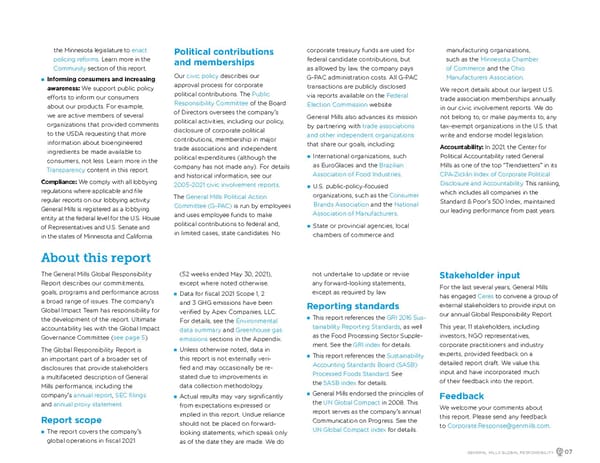the Minnesota legislature to enact policing reforms . Learn more in the Community section of this report. n Informing consumers and increasing awareness: We support public policy efforts to inform our consumers about our products. For example, we are active members of several organizations that provided comments to the USDA requesting that more information about bioengineered ingredients be made available to consumers, not less. Learn more in the Transparency content in this report. Compliance: We comply with all lobbying regulations where applicable and file regular reports on our lobbying activity. General Mills is registered as a lobbying entity at the federal level for the U.S. House of Representatives and U.S. Senate and in the states of Minnesota and California. Political contributions and memberships Our civic policy describes our approval process for corporate political contributions. The Public Responsibility Committee of the Board of Directors oversees the company’s political activities, including our policy, disclosure of corporate political contributions, membership in major trade associations and independent political expenditures (although the company has not made any). For details and historical information, see our 2005-2021 civic involvement reports . The General Mills Political Action Committee (G-PAC) is run by employees and uses employee funds to make political contributions to federal and, in limited cases, state candidates. No corporate treasury funds are used for federal candidate contributions, but as allowed by law, the company pays G-PAC administration costs. All G-PAC transactions are publicly disclosed via reports available on the Federal Election Commission website. General Mills also advances its mission by partnering with trade associations and other independent organizations that share our goals, including: n International organizations, such as EuroGlaces and the Brazilian Association of Food Industries . n U.S. public-policy-focused organizations, such as the Consumer Brands Association and the National Association of Manufacturers . n State or provincial agencies, local chambers of commerce and manufacturing organizations, such as the Minnesota Chamber of Commerce and the Ohio Manufacturers Association . We report details about our largest U.S. trade association memberships annually in our civic involvement reports. We do not belong to, or make payments to, any tax-exempt organizations in the U.S. that write and endorse model legislation. Accountability: In 2021, the Center for Political Accountability rated General Mills as one of the top “Trendsetters” in its CPA-Zicklin Index of Corporate Political Disclosure and Accountability . This ranking, which includes all companies in the Standard & Poor’s 500 Index, maintained our leading performance from past years. The General Mills Global Responsibility Report describes our commitments, goals, programs and performance across a broad range of issues. The company’s Global Impact Team has responsibility for the development of the report. Ultimate accountability lies with the Global Impact Governance Committee ( see page 5 ). The Global Responsibility Report is an important part of a broader set of disclosures that provide stakeholders a multifaceted description of General Mills performance, including the company’s annual report , SEC filings and annual proxy statement . Report scope n The report covers the company’s global operations in fiscal 2021 (52 weeks ended May 30, 2021), except where noted otherwise. n Data for fiscal 2021 Scope 1, 2 and 3 GHG emissions have been verified by Apex Companies, LLC. For details, see the Environmental data summary and Greenhouse gas emissions sections in the Appendix. n Unless otherwise noted, data in this report is not externally veri- fied and may occasionally be re- stated due to improvements in da ta collection methodology. n Actual results may vary significantly from expectations expressed or implied in this report. Undue reliance should not be placed on forward- looking statements, which speak only as of the date they are made. We do not undertake to update or revise any forward-looking statements, except as required by law. Reporting standards n This report references the GRI 2016 Sus- tainability Reporting Standards , as well as the F ood Processing Sector Supple- ment. See the GRI index for details. n This report references the Sustainability Accounting Standards Board (SASB) Processed Foods Standard . See the S ASB index for details. n General Mills endorsed the principles of the UN Global Compact in 2008. This report serves as the company’s annual Communication on Progress. See the UN Global Compact index for details. Stakeholder input For the last several years, General Mills has engaged Ceres to convene a group of external stakeholders to provide input on our annual Global Responsibility Report. This year, 11 stakeholders, including investors, NGO representatives, corporate practitioners and industry experts, provided feedback on a detailed report draft. We value this input and have incorporated much of their feedback into the report. Feedback We welcome your comments about this report. Please send any feedback to [email protected] . About this report GENERAL MILLS GLOBAL RESPONSIBILITY 07
 GeneralMills Global Responsibility Report Page 8 Page 10
GeneralMills Global Responsibility Report Page 8 Page 10